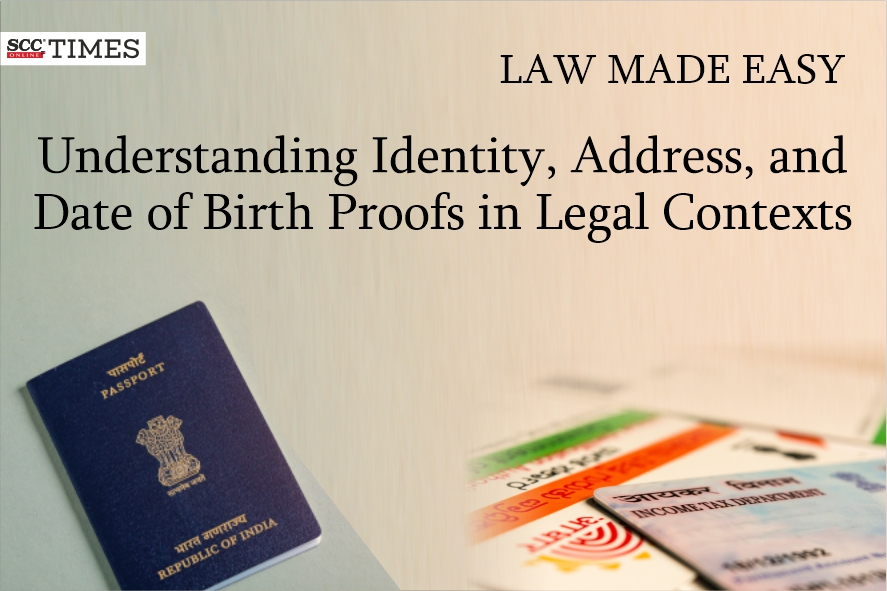Introduction1
In today’s interconnected world, the significance of identity proof in India, address, and date of birth proofs extends far beyond mere bureaucratic requirements.2 These proofs serve as the bedrock of trust and accountability in numerous spheres, from legal proceedings to financial transactions and from healthcare access to social services. Without robust verification mechanisms, the integrity of these interactions would be compromised, leaving individuals vulnerable to exploitation, fraud, and systemic abuse. Thus, understanding the legal frameworks and mechanisms governing identity proof in India, address, and date of birth proofs is not just a matter of compliance but a vital aspect of safeguarding personal rights, ensuring fair treatment, and upholding the rule of law.3
Moreover, as technology continues to advance at a rapid pace, the landscape of identity verification is undergoing profound transformations. The advent of biometrics, digital signatures, and blockchain technology presents both opportunities and challenges in redefining how identities are established and authenticated. While these innovations offer unprecedented convenience and efficiency, they also raise complex questions regarding privacy, data security, and individual autonomy. Navigating this dynamic terrain requires a nuanced understanding of legal mandates, technological capabilities, and societal values to strike a balance between innovation and protection, ensuring that identity proof in India, address, and date of birth proofs remain reliable pillars of trust and accountability in an increasingly digitized world.
The following is an exhaustive list of important documents recognized as Identity proofs in India, address proofs, and date of birth proofs under various legal frameworks.4
Identity Proofs in India:5
-
Aadhaar Card – Issued under the Aadhaar (Targeted Delivery of Financial and Other Subsidies, Benefits and Services) Act, 2016.
-
Elector’s photo identity card – Issued under the Representation of the People Act, 1950.
-
Permanent account number (PAN) card – Issued under the Income Tax Act, 1961.
-
Passport – Issued under the Passports Act, 1967.
-
Driving License – Issued under the Motor Vehicles Act, 1988.
-
Arm’s license – Governed by the Arms Act, 1959.
-
Pensioner card – Issued under relevant pension laws and regulations.
-
Central Government Health Service Scheme photo card or Ex-servicemen Contributory Health Scheme photo card – Relevant to respective health schemes.
-
Photo identity card issued by the Central Government or State Government or Public Sector Undertaking or Public Financial Institution – Issued under respective administrative laws and regulations.
Address Proof in India
-
Aadhaar card – Issued under the Aadhaar (Targeted Delivery of Financial and Other Subsidies, Benefits and Services) Act, 2016.
-
Elector’s photo identity card – Issued under the Representation of the People Act, 1950.
-
Permanent account number (PAN) card – Issued under the Income Tax Act, 1961.
-
Passport – Issued under the Passports Act, 1967.
-
Driving License – Issued under the Motor Vehicles Act, 1988.
-
Ration card – Governed by various state-specific laws and regulations.
-
Registered lease or rent agreement – Governed by contract law.
-
Property tax assessment order – Governed by municipal or local tax laws.
-
Certificate of address signed by a Member of Parliament or Member of Legislative Assembly or Municipal Councilor or a Gazetted Officer – As per administrative rules.
-
Employer certificate in original – As per employer-employee relationship laws and regulations.
Previously considered a reliable document for address verification, ration cards have lost their status as valid address proof following a recent ruling by the Delhi High Court. This decision marks a significant shift in the legal landscape, prompting the need for individuals and organizations to reassess their reliance on ration cards for address verification purposes.
Date of Birth Proof in India:
-
Birth certificate – Issued under the Registration of Births and Deaths Act, 1969.
-
Permanent account number (PAN) card – Issued under the Income Tax Act, 1961.
-
Matriculation certificate or Mark sheet of recognized Board – Issued under respective education board regulations.
-
Passport – Issued under the Passports Act, 1967.
-
Driving License – Issued under the Motor Vehicles Act, 1988.
-
Aadhaar card – Issued under the Aadhaar (Targeted Delivery of Financial and Other Subsidies, Benefits and Services) Act, 2016.
-
Elector’s photo identity card – Issued under the Representation of the People Act, 1950.
-
Central Government Health Service Scheme photo card or Ex-servicemen Contributory Health Scheme photo card – Relevant to respective health schemes.
In conclusion, as demonstrated by the exhaustive list of recognized documents, these proofs serve as pillars of trust and accountability in numerous domains, from financial transactions to access to social services. However, the evolving nature of technology and recent legal rulings, such as the Delhi High Court’s decision regarding ration cards, underscore the necessity for continuous evaluation and adaptation in this field. Balancing innovation with protection remains paramount to ensure that identity verification mechanisms remain reliable and secure in an increasingly digitized world.6 By staying abreast of legal mandates and technological advancements, stakeholders can effectively navigate this dynamic landscape, preserving the fundamental principles of fairness, privacy, and individual autonomy.
1. E Governance Identity and Privacy
2. Foundational identity: Empowering every citizen’s rights to health, education, and democracy
3. Data Privacy in the Digital Age: Balancing Innovation and Personal Security
4. Document acceptable as Proof of Identity, Address and Date of Birth for Form49A
6. Data Privacy in the Digital Age: Balancing Innovation and Personal Security






